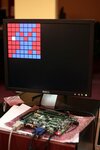MAAASD
Member level 4
E-books- how to get benefits?
Hello dears,
I was reading an e-book about digital design with VHDL and stopped for many days,
and now i'd like to continue reading. But i discovered that, nothing from what i had read is in my mind!
i lost every single word i had read before! annoying doesn't it?
Do i have to read it again from the beginnin'?
i'm asking you now to tell me how can one get the maximum benefit from reading such a book?
Thanks in advance!
Hello dears,
I was reading an e-book about digital design with VHDL and stopped for many days,
and now i'd like to continue reading. But i discovered that, nothing from what i had read is in my mind!
i lost every single word i had read before! annoying doesn't it?
Do i have to read it again from the beginnin'?
i'm asking you now to tell me how can one get the maximum benefit from reading such a book?
Thanks in advance!
